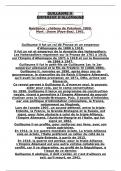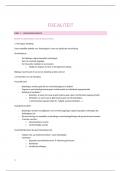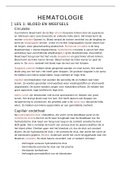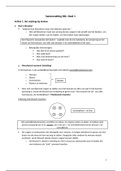Financial risk management
Introduction to derivatives’ markets
Derivative an instrument whose value depends on, or is derived from, the value of another
asset.
- Stock option: derivative whose value is dependent on the price of a stock
Derivatives are important:
- Derivatives play a key role in transferring risks in the economy
- The underlying assets include stocks, currencies, interest rates, commodities, debt
instruments, electricity, insurance payouts, the weather, etc
- Many financial transactions have embedded derivatives: derivatives hidden in the contract
Derivatives are traded:
- On exchanges
- In the over-the-counter (OTC) market where traders working for banks, fund managers and
corporate treasurers contact each other directly
Derivatives are used:
- To hedge risks
- To speculate (take a view on the future direction of the market)
- To lock in an arbitrage profit
- To change the nature of a liability
- To change the nature of an investment without incurring the costs of selling one portfolio
and buying another
Forward contracts
Forward contract: an agreement to buy or sell an asset at a certain future time for a certain price «
spot contract: agreement to buy or sell an asset almost immediately
- Long position: one of the parties agrees to buy the underlying asset on a certain specified
future date for a certain specified price.
- Short position: other party agrees to sell the asset on the same date for the same price
Forward price:
- The forward price for a contract is the delivery price that would be applicable to the contract
if were negotiated today but for delivery in 3 moths, 6 months, 9 months, …
- Time value of money: forward price may be different for contract of different maturities
Future contracts
Futures contract: an agreement between two parties to buy or sell an asset at a certain time in the
future for a certain price, but they are usually traded on an exchange.
(forward contracts are usually traded in the over-the-counter market)
Options
Options: the right to do something, the holder does not have to exercise the right
- Call option: gives the holder the right to buy the underlying asset by a certain date for a
certain price
1
, o Buy the call option: you buy the right to buy something (long position)
o Sell the call option: you sell the right to buy something from you (short position)
- Put option: gives the holder the right to sell the underlying asset by a certain date for a
certain price
o Buy the put option: you buy the right to sell something (long position)
o Sell the put option: you sell the right that somebody has to sell something to you
(short position)
Exercise price or strike price: price in the contract
Expiration date or maturity: date in the contract
American option: can be exercised at any time up to the expiration date
European options: can be exercised only on the expiration date itself
Bermudan option: you have discrete multiple exercise periods in a year. Less than American because
it is continuous exercisable, but more flexible than the European option.
o Cash settled: possible that you can payout the difference between reference price
and real price.
Principle of arbitrage
F=S (1+r)T
- r: is the 1-year (domestic currency) risk-free rate of interest
- S: spot price
- T: contract deliverable in T years
- F: forward price
2 options:
- If the forward is higher than there is an arbitrage opportunity to go short in the forward
contract.
- If the forward is lower than I short it now in the market and go long in the forward contract.
ð Arbitrage drives the forward contract prices
ð Arbitrage cannot be a risky position
Options vs futures/forwards:
- A future/forward contract gives the holder the obligation to buy or sell at a certain price
- An option gives the holder the right to buy or sell at a certain price
Types of traders
- Hedgers: use of derivatives to reduce risk that they face from potential future movements in
a market variable
- Speculators: use of derivatives to bet on the future direction of a market variable
- Arbitrageurs: take offsetting positions in two or more instruments to lock in a profit
Dangers
- Traders can switch from being hedgers to speculators or from being arbitrageurs to
speculators.
- It is important to set up controls to ensure that trades are using derivatives in for their
intended purpose
2
,Hedge funds
- Hedge funds are not subject to the same rules as mutual funds and cannot offer their
securities publicly
- Mutual funds must:
o Disclose investment policies
o Makes shares redeemable at any time
o Limit use of leverage
o Take no short positions
- Hedge funds are not subject to these constraints
- Hedge funds use complex trading strategies and are big users of derivatives for hedging,
speculation and arbitrage
Type of hedge funds:
- Long/short equities: purchase securities considered to be undervalued and short those
considered to be overvalued in such a way that the exposure to the overall direction of the
market is small
- Convertible arbitrage: take a long position in a thought-to-be-undervalued convertible bond
combined with an actively managed short position in the underlying equity
- Distressed securities: buy securities issued by companies in, or close to, bankruptcy
- Emerging markets: invest in debt and equity of companies in developing or emerging
countries and in the debt of the countries themselves
- Global macro: carry out trades that reflect anticipated global macroeconomic trends
- Merger arbitrage: trade after possible merger or acquisition is announced so that a profit is
made if the announced deal takes place
3
, Mechanics of futures markets
Futures are traded on the exchange and the contract terms are standardized by that exchange.
Specification of a future contract
- Available on a wide range of assets
- Exchange traded
- Specifications need to be defined:
o What can be delivered
o Where it can be delivered
o When it can be delivered
o Settled daily: gains and losses from the day's trading are deducted or credited to
your account each day at the end of the trading session
There is a convergence of futures price to the spot price (book p.: 51)
The operation of margin accounts
- A margin is cash or marketable securities deposited by an investor with his or her broker
- The balance in the margin account is adjusted to reflect daily settlement
- Margins minimize the possibility of a loss through a default on the contract
Takin a long position in the spot market involves buying the asset for immediate delivery and presents
no problems.
Taking a short position involves selling an asset that you do not own.
When the future price increases:
- Loss for short position
Margin account is adjusted to reflect the investor’s gain or loss.
When the future price decreases:
- Loss for long position
4
Introduction to derivatives’ markets
Derivative an instrument whose value depends on, or is derived from, the value of another
asset.
- Stock option: derivative whose value is dependent on the price of a stock
Derivatives are important:
- Derivatives play a key role in transferring risks in the economy
- The underlying assets include stocks, currencies, interest rates, commodities, debt
instruments, electricity, insurance payouts, the weather, etc
- Many financial transactions have embedded derivatives: derivatives hidden in the contract
Derivatives are traded:
- On exchanges
- In the over-the-counter (OTC) market where traders working for banks, fund managers and
corporate treasurers contact each other directly
Derivatives are used:
- To hedge risks
- To speculate (take a view on the future direction of the market)
- To lock in an arbitrage profit
- To change the nature of a liability
- To change the nature of an investment without incurring the costs of selling one portfolio
and buying another
Forward contracts
Forward contract: an agreement to buy or sell an asset at a certain future time for a certain price «
spot contract: agreement to buy or sell an asset almost immediately
- Long position: one of the parties agrees to buy the underlying asset on a certain specified
future date for a certain specified price.
- Short position: other party agrees to sell the asset on the same date for the same price
Forward price:
- The forward price for a contract is the delivery price that would be applicable to the contract
if were negotiated today but for delivery in 3 moths, 6 months, 9 months, …
- Time value of money: forward price may be different for contract of different maturities
Future contracts
Futures contract: an agreement between two parties to buy or sell an asset at a certain time in the
future for a certain price, but they are usually traded on an exchange.
(forward contracts are usually traded in the over-the-counter market)
Options
Options: the right to do something, the holder does not have to exercise the right
- Call option: gives the holder the right to buy the underlying asset by a certain date for a
certain price
1
, o Buy the call option: you buy the right to buy something (long position)
o Sell the call option: you sell the right to buy something from you (short position)
- Put option: gives the holder the right to sell the underlying asset by a certain date for a
certain price
o Buy the put option: you buy the right to sell something (long position)
o Sell the put option: you sell the right that somebody has to sell something to you
(short position)
Exercise price or strike price: price in the contract
Expiration date or maturity: date in the contract
American option: can be exercised at any time up to the expiration date
European options: can be exercised only on the expiration date itself
Bermudan option: you have discrete multiple exercise periods in a year. Less than American because
it is continuous exercisable, but more flexible than the European option.
o Cash settled: possible that you can payout the difference between reference price
and real price.
Principle of arbitrage
F=S (1+r)T
- r: is the 1-year (domestic currency) risk-free rate of interest
- S: spot price
- T: contract deliverable in T years
- F: forward price
2 options:
- If the forward is higher than there is an arbitrage opportunity to go short in the forward
contract.
- If the forward is lower than I short it now in the market and go long in the forward contract.
ð Arbitrage drives the forward contract prices
ð Arbitrage cannot be a risky position
Options vs futures/forwards:
- A future/forward contract gives the holder the obligation to buy or sell at a certain price
- An option gives the holder the right to buy or sell at a certain price
Types of traders
- Hedgers: use of derivatives to reduce risk that they face from potential future movements in
a market variable
- Speculators: use of derivatives to bet on the future direction of a market variable
- Arbitrageurs: take offsetting positions in two or more instruments to lock in a profit
Dangers
- Traders can switch from being hedgers to speculators or from being arbitrageurs to
speculators.
- It is important to set up controls to ensure that trades are using derivatives in for their
intended purpose
2
,Hedge funds
- Hedge funds are not subject to the same rules as mutual funds and cannot offer their
securities publicly
- Mutual funds must:
o Disclose investment policies
o Makes shares redeemable at any time
o Limit use of leverage
o Take no short positions
- Hedge funds are not subject to these constraints
- Hedge funds use complex trading strategies and are big users of derivatives for hedging,
speculation and arbitrage
Type of hedge funds:
- Long/short equities: purchase securities considered to be undervalued and short those
considered to be overvalued in such a way that the exposure to the overall direction of the
market is small
- Convertible arbitrage: take a long position in a thought-to-be-undervalued convertible bond
combined with an actively managed short position in the underlying equity
- Distressed securities: buy securities issued by companies in, or close to, bankruptcy
- Emerging markets: invest in debt and equity of companies in developing or emerging
countries and in the debt of the countries themselves
- Global macro: carry out trades that reflect anticipated global macroeconomic trends
- Merger arbitrage: trade after possible merger or acquisition is announced so that a profit is
made if the announced deal takes place
3
, Mechanics of futures markets
Futures are traded on the exchange and the contract terms are standardized by that exchange.
Specification of a future contract
- Available on a wide range of assets
- Exchange traded
- Specifications need to be defined:
o What can be delivered
o Where it can be delivered
o When it can be delivered
o Settled daily: gains and losses from the day's trading are deducted or credited to
your account each day at the end of the trading session
There is a convergence of futures price to the spot price (book p.: 51)
The operation of margin accounts
- A margin is cash or marketable securities deposited by an investor with his or her broker
- The balance in the margin account is adjusted to reflect daily settlement
- Margins minimize the possibility of a loss through a default on the contract
Takin a long position in the spot market involves buying the asset for immediate delivery and presents
no problems.
Taking a short position involves selling an asset that you do not own.
When the future price increases:
- Loss for short position
Margin account is adjusted to reflect the investor’s gain or loss.
When the future price decreases:
- Loss for long position
4












